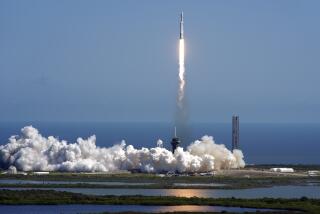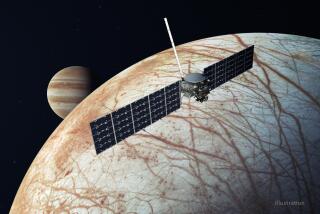Review: ‘Europa Report’ gets good mileage from low-budget sci-fi
- Share via
“Europa Report” is a Grade A version of a B picture, a streamlined science fiction story that smartly tells a familiar tale without breaking the bank.
Though modern moviemaking often mandates that science fiction be synonymous with multimillion-dollar expenditures, director Sebastian Cordero and a crack team including cinematographer Enrique Chediak and production designer Eugenio Caballero (who won an Oscar for Guillermo del Toro’s “Pan’s Labyrinth”) have crafted a visually sophisticated film that elegantly involves audiences on a budget of less than $10 million.
While cinematic spaceships have been leaving our planet for distant destinations at least since Georges Méliès’ 1902 “A Trip to the Moon,” the unfolding narrative of Europa One (named for the moon of Jupiter it’s headed for) captures the excitement of space travel in a way that’s not business as usual.
PHOTOS: Hollywood backlot moments
As written by Philip Gelatt, “Europa Report” is a mock documentary supposedly compiled from thousands of hours of declassified footage taken by eight on-board cams as that ship sped the nearly 400 million miles to Europa. Interviews with Earth-bound project director Dr. Samantha Ungar (Embeth Davidtz) and archival TV news footage fill us in on necessary background.
That TV footage reveals that, excited by indications of conditions on Europa that could produce life, private investors put together $3.7 billion to fund a mission in hopes of making what one scientist calls “the single most profound discovery in human history.”
The ship has a six-person, multinational crew whose most memorable members are James Corrigan (Sharlto Copley of “District 9”), who is always making videos for his son; dour Russian Andrei Blok (Michael Nyqvist, the star of the Swedish versions of “The Girl With the Dragon Tattoo” trilogy); and short-haired and sparky pilot Rosa Dasque (Romania’s Anamaria Marinca of “4 Months, 3 Weeks, 2 Days”).
The gang gets a jolt early in the film when they lose communication with Earth and the crew has to go on for months burdened by the knowledge that “no one knows we’re alive.”
That loss, combined with a terrifying incident involving two of the crew members, puts everyone on edge as they get closer and closer to Europa.
Once the landing module alights on this spooky moon, things get increasingly difficult. One virtue of “Europa Report” is that it allows us to feel everyone’s insecurity and fear as situations arise that are definitely not in the space explorer’s handbook.
While “Europa Report” does quite well dramatically without breaking any new ground, its great strength is how striking it is visually and the stratagems it employs to make itself memorable.
Determined to create as realistic a look for the spacecraft as possible, not to mention a credible moonscape for Europa, production designer Caballero consulted closely with scientists from NASA, the Jet Propulsion Laboratory and SpaceX, the Elon Musk-founded private space travel company. The results feel convincing in a way other films have not always managed.
Because of the nature of the script, Caballero had to construct an enclosed 360-degree set, essential for using cinematographer Chediak’s system of eight fixed cameras that mimic the spaceship’s always-on cams.
“It was unique in that every other movie I’ve done you move the camera to accommodate the actors,” Chediak has said. “On this particular project, you move the actors to accommodate the cameras.”
In an age of cynicism and sarcasm, “Europa Report” is also noteworthy because it manages to maintain an air of idealistic hope and a belief in the value of classic questions like “Are we alone?” When one of the crew speaks up and says, “What does a life matter compared to the breadth of knowledge to be learned?” that’s the message of the film as well.
‘Europa Report’
MPAA rating: PG-13 for sci-fi action and peril
Running time: 1 hour, 30 minutes
Playing: At Sundance Sunset, West Hollywood
More to Read
Only good movies
Get the Indie Focus newsletter, Mark Olsen's weekly guide to the world of cinema.
You may occasionally receive promotional content from the Los Angeles Times.











